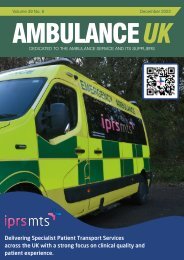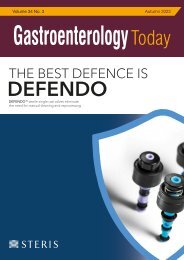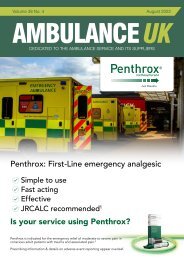Gastroenterology Today Winter 2022
Gastroenterology Today Winter 2022
Gastroenterology Today Winter 2022
You also want an ePaper? Increase the reach of your titles
YUMPU automatically turns print PDFs into web optimized ePapers that Google loves.
FEATURE<br />
Table 3 The reported side effects after Covid-19 vaccination in<br />
patients with IBD<br />
Side effects<br />
Localized injection-site [17–20, 27] (5/15)<br />
Fatigue/malaise [17, 18, 20, 27] (4/15)<br />
Myalgia [17, 18, 20, 27] (4/15)<br />
Gastrointestinal symptoms (including nausea, vomiting, diarrhea,<br />
abdominal pain) [17, 18, 27] (3/15)<br />
Headache/dizziness/lightheadedness [17, 19, 27] (3/15)<br />
Joint pain [18, 20, 27] (3/15)<br />
Fever/chills [17, 27] (2/15)<br />
IBD exacerbation [20] (2/15)<br />
Skin/nail or face changes [17, 27] (2/15)<br />
Sleep changes [17] (1/15)<br />
Memory/mood changes [17] (1/15)<br />
Swollen lymph node [17] (1/15)<br />
Cough, chest/breathing symptoms [17] (1/15)<br />
Eye/ear/mouth/throat changes [17] (1/15)<br />
In a study by Pozdnyakova et al., it was revealed that two weeks after<br />
vaccination, positive antibody levels were detected in more than 90%<br />
of IBD patients. Tthe multivariable analysis showed that at week 2, only<br />
vaccine type was associated with antibody levels, with both Moderna<br />
and Pfizer having significantly higher levels than Jahnson & Jahnson.<br />
Also, at week 8, vaccine type remained independently associated with<br />
antibody levels. On the other hand, lower titers were independently<br />
associated with both a longer duration between completion of vaccine<br />
regimen and blood sampling and IMT receiving. They concluded<br />
that positive levels of IgG(S) were achieved in virtually all IBD vaccine<br />
recipients regardless of vaccine type and IMT use [24].<br />
Furthermore, total IgG antibodies increased 21.13 times after dose 1<br />
and 90 times after dose 2 in Rodriguez-Martino et al.’s study. VTN%<br />
increased 11.92 times after dose 1 and 53.79 times after dose 2. Total<br />
IgG antibodies and VTN% were lower in IBD patients after dose 2. In<br />
their study, IgG antibodies increased after dose 2, but remained lower<br />
than control group. However, VTN% were similar to controls after dose<br />
2. CD4 and CD8 mean levels had an upward trend after vaccination<br />
[25].<br />
GASTROENTEROLOGY TODAY - WINTER <strong>2022</strong><br />
No difference in disease outcome was observed during the first 40<br />
days after the second vaccination, however time to flare was shorter in<br />
vaccinated compared with unvaccinated IBD patients [10].<br />
In another study, Edelman-Klapper et al. found that Covid-19 anti-S IgG<br />
antibodies in all control group were seropositive, whereas about 7% of<br />
patients with IBD, regardless of treatment, remained seronegative after<br />
dose 1, and it was positive in all patients after dose 2. It means that<br />
neither IBD itself nor anti-TNFa treatment eliminate the ability to mount<br />
serologic response to vaccination. However, anti-TNFa treatment was<br />
associated with significantly lower antibody levels compared with nonanti-TNFa<br />
treated patients, and control group. Also, neutralizing and<br />
inhibitory functions were both lower in anti-TNFa treated compared with<br />
non-anti-TNFa treated patients, and control group. Moreover, Anti-TNFa<br />
drug levels and vaccine responses did not affect anti-spike levels. But,<br />
IBD activity was unaffected by vaccination. The results of multivariate<br />
linear regression model showed that only anti-TNFa treatment and older<br />
age maintained a significant distinct association with lower IgG anti-S<br />
response [19].<br />
Kappelman et al. found antibody response was decreased in IBD patients<br />
receiving systemic corticosteroids. In these patients, the proportion of<br />
detectible antibodies was 85% versus 95% among non-steroid users.<br />
However, antibody response was generally similar across age group,<br />
vaccine type, and use of other classes of IBD medications [22].<br />
Moreover, Kennedy et al. showed that the concentration of anti-<br />
Covid-19 antibody following vaccination were lower in patients treated<br />
with infliximab than vedolizumab. Multivariable models indicated that<br />
antibody concentrations were lower in patients treated with infliximab<br />
compared with vedolizumab. Age≥60 years, immunomodulator use,<br />
Crohn’s disease and smoking were related with lower, while non-white<br />
ethnicity was related with higher Covid-19 antibody concentrations.<br />
Moreover, seroconversion rates after a single dose of either vaccine<br />
were higher in patients with prior Covid-19 infection and after two doses<br />
of Pfizer vaccine [23].<br />
In Shehab et al.’s study, in patients being treated with infliximab and<br />
adalimumab, the proportion of patients who achieved positive anti-<br />
Covid-19 IgG antibody levels after receiving two doses of the vaccine<br />
were 74.5% and 81.2%. Also, it was found that in patients receiving<br />
ustekinumab and vedolizumab, the proportion of patients who achieved<br />
positive anti-Covid-19 IgG antibody levels after receiving two doses of<br />
the vaccine were 100% and 92.8%. In patients receiving infliximab and<br />
adalimumab, the proportion of patients who had positive anti-Covid-19<br />
neutralizing antibody levels after two-dose vaccination were 67.7%<br />
and 87.5%. The proportion of patients who had positive anti-Covid-19<br />
neutralizing antibody levels were 92.3% and 92.8% in patients receiving<br />
ustekinumab and vedolizumab [26].<br />
It was reported in Wong et al.’s study that all IBD patients with 2 doses<br />
of vaccination, had positive anti-RBD tests, of whom 84.6% achieved<br />
index levels. Also, it was found that anti-TNF were related to lower<br />
anti-RBD total immunoglobulin. Moreover, Vedolizumab was associated<br />
with lower anti-RBD total immunoglobulin, anti-RBD IgG, and anti-S IgG<br />
than in control group. The results of multiple linear regression analyses<br />
showed no association between timing of infusion and antibody<br />
response [27].<br />
Side effects<br />
Totally, seven studies mentioned the side effects of Covid-19<br />
vaccinations in patients with IBD [17-21, 27, 28].<br />
In the study by Edelman-Klapper et al., it was reported that immediate<br />
and short-term side effects s were detected using phone call and<br />
accepted questionnaires, respectively. However, no severe adverse<br />
events were reported. Side effects were more after dose 2 compared<br />
with dose 1. The most common side effects were local pain (< 70%) and<br />
headache (about 30%). Infection rate (about 2%) and side effects were<br />
similar in all groups [19].<br />
In another study by Botwin et al., the most common severe symptom<br />
after dose 1 was fatigue/malaise (3%); other severe symptoms were<br />
reported by 2% or fewer subjects. The most common severe symptoms<br />
20

















